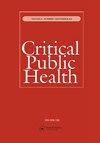Inequities in maternal stressful life events between Indigenous and non-Indigenous women – evidence from a prospective cohort study in New Zealand
IF 3.1
3区 医学
Q2 PUBLIC, ENVIRONMENTAL & OCCUPATIONAL HEALTH
引用次数: 0
Abstract
ABSTRACT Experiences of major, stressful life events (SLE) prior to and during pregnancy, and in early childhood, are associated with a range of adverse outcomes that disproportionately impact Indigenous women and their families. However, little is known about Indigenous women's experiences of SLE . The aim of this study was to investigate: (1) inequities in the prevalence and patterning of SLE between Indigenous and non-Indigenous mothers over time, and; (2) associations between maternal SLE and ethnicity, age, socioeconomic deprivation and time. Data were from the Moe Kura prospective cohort study of 418 Indigenous Māori and 768 non-Māori women in New Zealand. Questionnaires were completed at 35–37 weeks gestation, 12-weeks postpartum, and when their child was 3–4 years of age. The prevalence of five SLE domains was estimated by ethnicity. Generalised linear mixed effects models examined associations between SLE domains and ethnicity, age, socioeconomic deprivation, and time. The prevalence of SLE was greater for Māori than non-Māori at each time point. The probability of reporting SLE increased as neighbourhood deprivation worsened. The probability of reporting SLE reduced with older age, although changes in the estimates were greater for non-Māori than Māori women. Findings show that Indigenous women experience persistent and significant inequities in SLE. Younger maternal age and greater socioeconomic deprivation explain some but not all of the inequities observed. Policies and interventions to address how colonialism and racism structure experiences of SLE for Indigenous women, including via socioeconomic deprivation, are required.土著和非土著妇女在产妇压力生活事件中的不平等——来自新西兰一项前瞻性队列研究的证据
在怀孕前、怀孕期间和儿童早期经历重大、紧张的生活事件(SLE)与一系列不良后果相关,这些不良后果对土著妇女及其家庭的影响不成比例。然而,对土著妇女SLE的经历了解甚少。本研究的目的是调查:(1)随着时间的推移,土着母亲和非土着母亲之间SLE患病率和模式的不平等;(2)母亲SLE与种族、年龄、社会经济剥夺和时间的关系。数据来自新西兰418名土著Māori和768名non-Māori妇女的Moe Kura前瞻性队列研究。问卷分别在怀孕35-37周、产后12周和孩子3-4岁时完成。按种族估计5个SLE域的患病率。广义线性混合效应模型检验了SLE域与种族、年龄、社会经济剥夺和时间之间的关系。在每个时间点,Māori的SLE患病率都高于non-Māori。报告SLE的可能性随着邻里剥夺的恶化而增加。报告SLE的可能性随着年龄的增长而降低,尽管non-Māori比Māori女性的估计变化更大。研究结果表明,土著妇女在SLE中经历了持续和显著的不平等。更年轻的母亲年龄和更严重的社会经济剥夺解释了部分(但不是全部)观察到的不平等现象。需要制定政策和干预措施,以解决殖民主义和种族主义如何结构土著妇女的SLE经历,包括通过社会经济剥夺。
本文章由计算机程序翻译,如有差异,请以英文原文为准。
求助全文
约1分钟内获得全文
求助全文
来源期刊

Critical Public Health
Multiple-
CiteScore
5.90
自引率
7.10%
发文量
36
期刊介绍:
Critical Public Health (CPH) is a respected peer-review journal for researchers and practitioners working in public health, health promotion and related fields. It brings together international scholarship to provide critical analyses of theory and practice, reviews of literature and explorations of new ways of working. The journal publishes high quality work that is open and critical in perspective and which reports on current research and debates in the field. CPH encourages an interdisciplinary focus and features innovative analyses. It is committed to exploring and debating issues of equity and social justice; in particular, issues of sexism, racism and other forms of oppression.
 求助内容:
求助内容: 应助结果提醒方式:
应助结果提醒方式:


